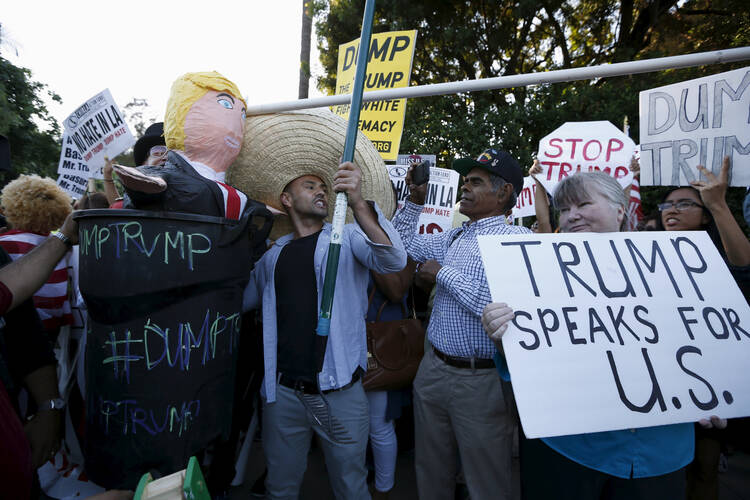Two days before Thanksgiving, the Real Clear Politics average of national polls has Donald Trump with 28 percent of the national GOP primary vote, putting him eight points ahead of Ben Carson. Mr. Trump has actually improved from 23 percent in early October, when the party establishment dared to hope that he was in a permanent decline; his chest-thumping after the terrorism attacks in Paris and his increasingly reckless disregard for the truth has only emboldened his supporters. But Nate Silver is standing firm while panic about Donald Trump grows within the Republican Party. He writes that betting markets’ estimate that Mr. Trump now has a 20 percent chance of securing the GOP nomination is “substantially too high.”
“Right now,” Mr. Silver writes, “he has 25 to 30 percent of the vote in polls among the roughly 25 percent of Americans who identify as Republican. (That’s something like 6 to 8 percent of the electorate overall, or about the same share of people who think the Apollo moon landings were faked.)”
Most political scientists still regard the Trump campaign as a house of cards that hasn’t yet survived a good shake of the table. Mr. Silver cites the poor response rates to polls and the difficulty of determining who will actually vote in primaries and caucuses. He also notes that exit polls from elections going back to 2000 suggest that most people in Iowa (whose caucuses are still two months away) and New Hampshire have not really made up their minds: “In Iowa, on average, only 35 percent of voters had come to a final decision before the final month of the campaign. And in New Hampshire, only 29 percent had.”
The Trump phenomenon may be an unprecedented development in American politics—no one so ill-qualified to be president, and so hostile toward other public officials that he might have to use blackmail threats to fill his cabinet, has secured a major-party nomination—but right now it still seems like a grand practical joke. It’s a joke that may peak at this year’s Thanksgiving dinner, when millions of Americans will boast of their intention to put Mr. Trump in the White House, horrifying their children, in-laws, and hapless guests. It’s a safe bet that a lot of these provocateurs will drop the joke in the voting booth (maybe, alas, voting for a candidate who’s more adept at stirring up prejudices without constantly setting off fact-checker alarms).
My suspicion that voting for Trump is like starting a food fight at the dinner table—more often threatened than executed—is strengthened by a CBS News poll from Iowa and New Hampshire released last weekend. The Atlantic’s Russell Berman writes, “the most interesting finding came when the pollsters asked Trump’s supporters (as well as [Ben] Carson’s) what their ‘favorite thing’ about the candidate was. In both states, the clear winner was, ‘He says things others are afraid to say.’ Hardly any respondents said they were most drawn to Trump’s ‘personal success story’—which is more or less the stated rationale for his candidacy. Nor did many people cite his ‘outlook for America,’ which…is generally pretty grim.” About one-quarter of Trump supporters in both states said their favorite thing was “He’s not a typical politician,” —even though “He’ll say anything to get votes” is maybe the most common insult used against politicians, and that describes Mr. Trump to a T.
Mr. Trump, whose chief appeal lies in making outrageous statements about immigrants, racial minorities, and what he calls “losers” in American society, is famous for never admitting error, and I get the feeling many of his supporters of are of the same temperament. They’re not likely to tell pollsters that they’re abandoning their candidate because he said things that offend the New York Times editorial board.
This week NBC News interviewed Trump supporters in the wake of his spurious claim that “thousands” of people in New Jersey, presumably Muslims, were caught on film celebrating the destruction of the World Trade Center on 9/11. One said, “The only thing I can say and I don’t think it’s bad because it is a human trait, there might have been a slight exaggeration.” Another admitted that Mr. Trump might “bend the truth…but the bottom line is, he will get America great again.” Still another said he was amused that Mr. Trump is being called out for lying when “there’s never been more truth-bending in our lives” in Washington, D.C. Such comments suggest not so much an undying faith in a candidate but a reluctance to give the media and the Republican Party establishment the satisfaction of bringing down Mr. Trump.
If that’s true, Mr. Trump may still be leading in the polls when Iowa Republicans assemble for their caucuses on February 1. History suggests that his support will cool when voters seriously consider who should occupy the White House, but in the meantime, many are enjoying the indigestion he’s causing among most Americans.








